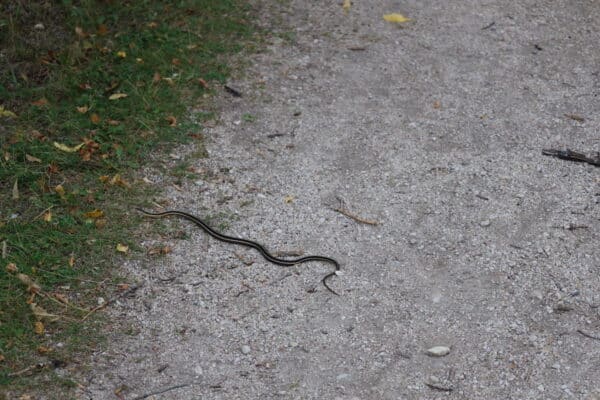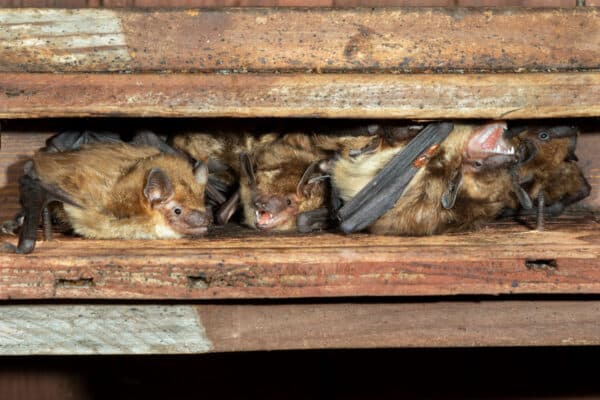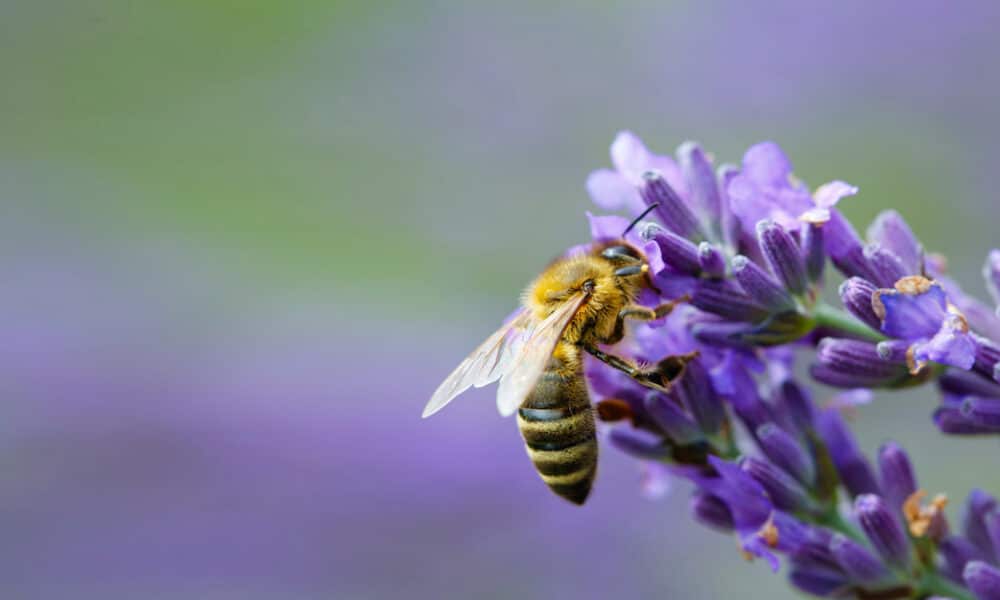
In the delicate balance of nature, every creature plays a vital role, and honeybees are no exception. These industrious pollinators contribute to the health and biodiversity of ecosystems, playing a crucial role in the production of fruits, vegetables, and other crops. However, when wildlife encounters occur in residential areas, there’s often concern about how to handle them safely and ethically.
At Covenant Wildlife Removal, we understand the importance of protecting honeybees and other wildlife while ensuring the safety and well-being of homeowners.
In this blog, we’ll explore why it’s essential to safeguard honeybees in your yard and provide tips for humane wildlife removal practices that prioritize their protection.
The Importance of Honeybees
The importance of honeybees cannot be overstated when considering their pivotal role in both natural ecosystems and agricultural landscapes. Honeybees, as primary pollinators, play a critical role in the reproduction of flowering plants, contributing to the pollination of approximately 75% of the world’s crops. This process is fundamental to the production of fruits, vegetables, nuts, and seeds, forming the backbone of global food security and agricultural economies.
In addition to their indispensable role in agriculture, honeybees are essential for maintaining the biodiversity and stability of natural ecosystems. As they forage for nectar and pollen, honeybees facilitate the reproduction of wild plant species, ensuring the health and resilience of diverse habitats. By supporting the growth of flowering plants, honeybees provide essential food sources for other wildlife species, including birds, insects, and mammals, thus sustaining complex food webs and ecological relationships.
Furthermore, honeybees contribute to the production of honey, beeswax, royal jelly, and other hive products that hold varying significance, including:
- Cultural
- Economic
- Medicinal
Honey, in particular, has been prized for its nutritional value, culinary versatility, and therapeutic properties for millennia, serving as a natural sweetener, food preservative, and traditional remedy for various ailments.
The Connection of Honeybees, Nature, and Humans
Beyond their ecological and economic importance, honeybees symbolize the interconnectedness of nature and humanity, highlighting the profound impact that small creatures can have on global ecosystems and human well-being. Their industriousness, social organization, and cooperative behavior inspire admiration and reverence, underscoring the need for responsible stewardship and conservation efforts to ensure their survival and prosperity in the face of mounting environmental challenges.
In summary, honeybees are indispensable contributors to the:
- Functioning of ecosystems
- Sustainability of agriculture
- Cultural heritage of humanity
Recognizing and safeguarding their vital role in the web of life is essential for preserving biodiversity, promoting food security, and fostering ecological resilience in an increasingly interconnected world. By prioritizing the protection and conservation of honeybees, we can cultivate a healthier, more sustainable future for all.
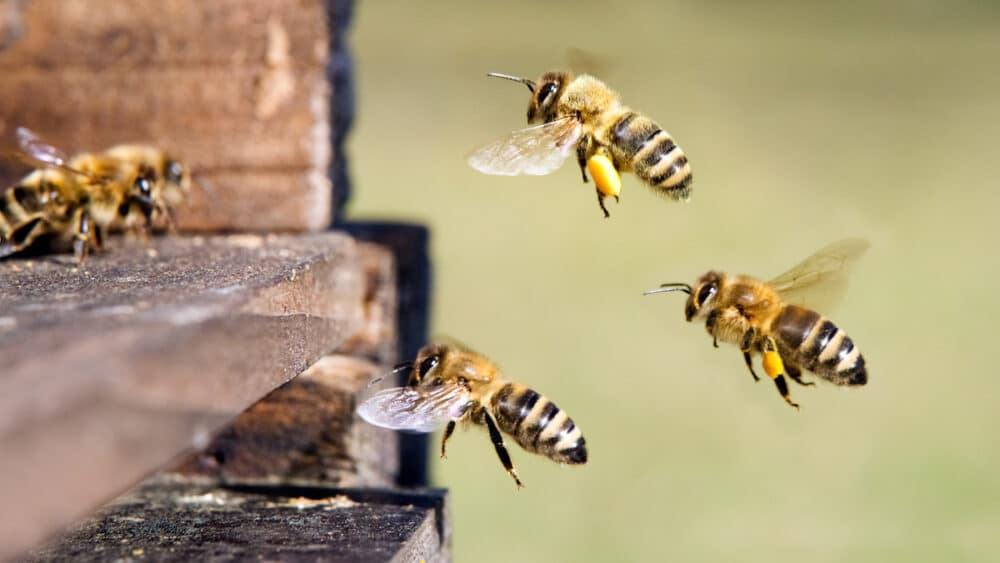
Recognizing the Threats to Honeybees
Despite their importance, honeybee populations face numerous threats that jeopardize their survival. The leading factors contributing to honeybee decline worldwide, include:
- Habitat loss
- Pesticide exposure
- Climate change
- Invasive species
- Disease outbreaks
In residential areas, encounters with wildlife, such as swarms of bees or beehives, can pose challenges for homeowners and honeybees alike. While it’s natural to feel concerned or alarmed by the presence of bees on your property, it’s essential to approach these situations with care, compassion, and respect for these valuable pollinators.
Create a Safe Space for Honeybees in Your Yard
Fostering honeybees in your yard can be a rewarding experience that benefits both the bees and your local ecosystem. By creating a bee-friendly environment and implementing safe practices, you can help support honeybee populations while minimizing the risk of conflicts or encounters.
Here are some tips for fostering honeybees in your yard in a safe way:
Plant Bee-Friendly Flowers
Create a diverse landscape with a variety of flowering plants that attract and provide food for honeybees. Choose native plant species that bloom at different times of the year to ensure a continuous source of nectar and pollen.
Avoid Pesticides
Minimize the use of pesticides, herbicides, and other chemical treatments in your yard, as these can be harmful to honeybees and other pollinators. Instead, opt for natural and organic pest control methods to maintain a healthy balance in your garden.
Provide Water Sources
Honeybees need access to clean water for hydration, especially during hot weather. Set up shallow dishes or trays filled with water in your yard, and add floating objects or rocks to provide landing spots for bees to drink safely.
Build Bee Habitat
Create nesting sites and shelters for honeybees by installing bee houses, nesting boxes, or bee hotels in your yard. These structures provide protection from predators and adverse weather conditions, encouraging bees to establish colonies and reproduce.
Maintain Bee-Friendly Practices
Practice responsible gardening and lawn care techniques that support honeybee health and habitat. Avoid over-mowing your lawn, leaving some areas uncut to allow wildflowers and native plants to flourish and provide additional forage for bees.
Educate Yourself and Others
Learn about the importance of honeybees and the threats they face, and share this knowledge with your community. Participate in local beekeeping workshops, gardening events, and conservation initiatives to promote bee-friendly practices and raise awareness about honeybee conservation.
Support Beekeeping Efforts
Consider supporting local beekeepers and honeybee conservation organizations by purchasing locally produced honey, beeswax products, or sponsoring hive installations in your area. By supporting beekeeping efforts, you can help strengthen honeybee populations and contribute to pollinator conservation efforts on a broader scale.
By following these tips and implementing bee-friendly practices in your yard, you can create a safe and welcoming environment for honeybees while supporting their vital role in pollination and ecosystem health. Together, we can work towards ensuring a sustainable future for honeybees and the ecosystems they support
Humane Wildlife Removal Practices
At Covenant Wildlife Removal, we specialize in safe and humane wildlife removal techniques that prioritize the protection of honeybees and other wildlife species. Our team of trained professionals follows strict guidelines and best practices to ensure that wildlife encounters are resolved peacefully and responsibly. When dealing with honeybee swarms or beehives, we take the following steps to minimize harm and promote coexistence:
1. Assessment and Evaluation
Before taking any action, we conduct a thorough assessment of the situation to determine the extent of the honeybee presence and any associated risks. We consider factors such as hive size, location, accessibility, and proximity to human activity to develop a tailored removal plan.
2. Bee-Friendly Solutions
Whenever possible, we employ bee-friendly removal methods that allow honeybees to be safely relocated without harm. This may involve using specialized equipment, such as bee vacuums or swarm traps, to capture and transport bees to a suitable habitat away from residential areas.
3. Protective Measures
To ensure the safety of both our team and the honeybees, we use protective gear and equipment during removal operations. This includes wearing bee suits, gloves, and veils to minimize the risk of stings and injuries.
4. Preservation of Hives
Whenever feasible, we strive to preserve honeybee hives and colonies intact, recognizing their ecological value and importance to local ecosystems. By carefully extracting and relocating hives, we help safeguard honeybee populations and promote their continued survival and well-being.
5. Education and Awareness
In addition to providing removal services, we also educate homeowners about the importance of honeybees and the need for ethical and responsible wildlife management practices. We offer tips for creating bee-friendly environments, such as:
- Planting pollinator-friendly flowers
- Avoiding the use of pesticides
- Supporting local beekeeping efforts
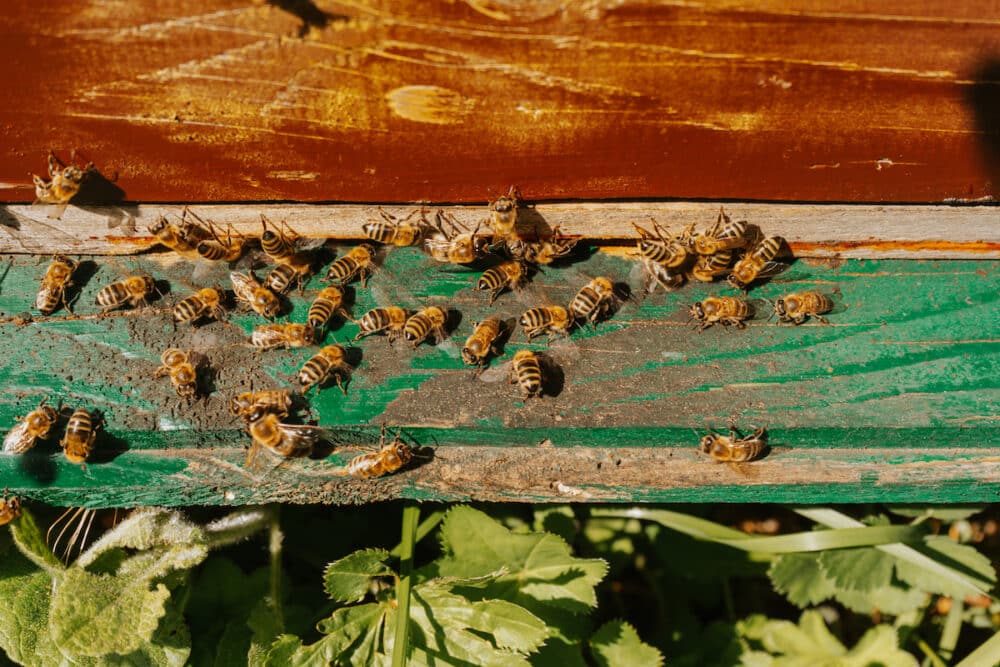
Do Your Best to Keep Honeybees Safe
Protecting honeybees in your yard is not only a matter of ecological responsibility but also a reflection of our commitment to coexist harmoniously with nature.
At Covenant Wildlife Removal, we’re dedicated to providing safe, ethical, and humane wildlife removal services that prioritize the protection of honeybees and other wildlife species. By taking proactive steps to address wildlife encounters with care and compassion, we can ensure the well-being of honeybees and foster a healthier, more sustainable environment for future generations.
If you encounter honeybees or other wildlife on your property, don’t hesitate to contact us for expert assistance and guidance. Together, we can create a safer and more bee-friendly world for all.
